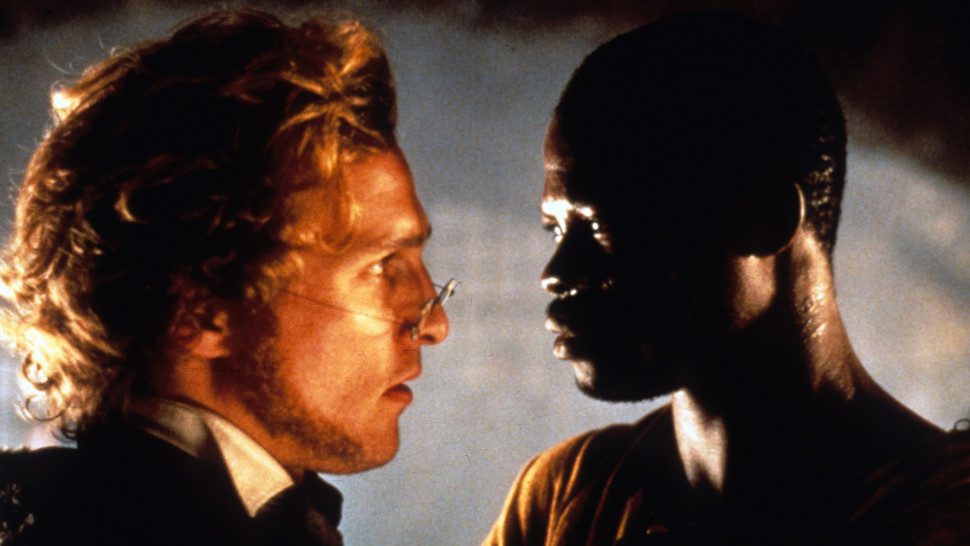When you found your own film studio, you can do whatever the hell you want. It’s common knowledge. That’s not quite what Steven Spielberg did after co-founding Dreamworks, but it’s close. He wanted to launch the studio with a big, prestigious Oscar play, and the resulting film is Amistad, which isn’t necessarily a bad film, but (for Spielberg, at least) is decidedly middle-of-the-road, almost embarrassingly earnest, and the rare film that handles a Very Important Subject, made by one of the best filmmakers who ever lived, that has left no cultural footprint whatsoever.
The thorny issue surrounding Amistad, as it did Spielberg’s adaptation of The Color Purple, is the long-standing argument of who “gets” to make what films. Was Spielberg, a white man, the best choice to direct either film, centered as they are on the subjugation and oppression of black men and women? Not necessarily, but here another question arises: would either film get made were Spielberg not sitting in the director’s chair with his ever-present ballcap? Hard to say. And one might add, the director of Schindler’s List might know a thing or two about historical oppression.
But this is all background noise of a sort, and ignores the baseline question of any piece of criticism: is Amistad any good? In parts, yes; in some parts, the film can be treacly and overly patriotic, which is misplaced given that the civil rights issue at the story’s core wouldn’t be resolved (if you can call it that, which you can’t) for over a hundred years. In other parts, though, Amistad is plainly brilliant, and of a piece with some of Spielberg’s best works. The bravura opening, for instance, puts the viewer right in the middle of the rebellion aboard the titular slave ship – it’s frantic, and unnerving, all the more so for the desperation, fury, and terror in the rebels’ eyes, and in all of their movements.
Where Amistad really shines, though, is in its depiction of America’s labyrinthine legal system. Roger Baldwin (Matthew McConaughey) wants to join the case on the slaves’ defense; he’s no trial lawyer, but a real estate attorney, and his idea is to treat the matter as less of a criminal trial than of a property trial. It’s a ghastly notion, and some characters treat it as such, but the film accepts it, and asks to as well. By no means is Amistad condoning Baldwin’s idea, or the systemic cruelty that leads to its viability; no, much like Lincoln (a better version of what this film is trying to be), Amistad takes a look at the backdoor proceedings and legal skullduggery built into our justice system. When one judge looks as though he’ll acquit the slaves, president Van Buren appoints a new one, one who might be more loyal to their cause. This is not done out of malice by Van Buren (at least not explicitly), but practicality; John C. Calhoun, one of the worst Americans who ever lived, all but threatens civil war if the slaves are acquitted. The American legal system is incomprehensible and impenetrable, a maze which produces few victors. It’s all a matter of politics and policies to the people at the top, and those who suffer are always, always the people at the bottom.
The performances elevate what could, on paper, be an exceedingly boring film. McConaughey is solid, even if his mannerisms are a bit anachronistic at times. Djimon Hounsou, as Cinque, who becomes something of a spokesman for the prisoners, excels, exuding the quiet dignitude that has become something of a trademark for him. Hounsou spends most of the movie speaking Mende, the language of Cinque’s tribe, and even without subtitles, he makes himself not only heard but understood. Regrettably, he’s saddled with one of the film’s most dated moments, when Cinque stands up in court and in broken English chants “Give us us free!” over and over. Far more effective is when he approaches McConaughey, and in that same broken English, manages a sincere “Thank you.”
Anthony Hopkins has the showiest role in the film, as John Quincy Adams, and with the character’s accent, eccentricities, and mutton chops, a lesser actor would surely have over played the part. But Hopkins finds the humanity amid all the irascibility and cantankerousness, and Adams’ closing speech before the Supreme Court – almost ten minutes long, and supposedly performed in one take – is the film’s high point. Hopkins brings levity and gravitas in equal measure.
Morgan Freeman is also in this film.
The sets and costumes are lovely, and Spielberg’s eye for detail is on full display, although the film is hampered significantly by what might be the worst score John Williams has ever composed. It’s upbeat when it should be dour or foreboding, and the reliance on African tribal drums in some passages has not aged well, to put it mildly. And that might be the overall problem with Amistad: its optimism. Spielberg so badly wants America to be this land of nobility and grace, but the story doesn’t support that. (To be fair, with some of Spielberg’s later films, like Minority Report, Munich, Lincoln, and Bridge of Spies, he expertly plumbs the moral gray areas of this country.) To put it plainly, Amistad doesn’t earn its happy-yet-bittersweet ending. The last image we see is of Cinque returning to Sierra Leone, and it just hammers home one simple fact, the acceptance of which would have changed this movie radically, and for the better: Cinque should have been the focus of the film.
Amistad doesn’t necessarily fit into the category of “missed opportunity,” because when it works, it works exceedingly well. At the end of the day, Spielberg meant well, but that’s not exactly high praise.

